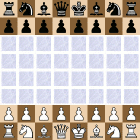- homonym words or names that have different meanings in the two languages (such as "fare", the word for "mouse" in Turkish),
- or words or names that denote the same thing that is common to the cultures related to both languages (e.g. Paris)
can be used.
the method: first a list of words of 4 or more letters (words of 2 and 3 letters should be easy to spot and numerous) that can go into this puzzle will be listed. the second step is preparing the puzzle using this list.
the issues: the two cultures have different crossword styles. while in english crosswords the black squares tend to be more structured, the Turkish puzzles care more about how many of those black square touch each other and in what ways. the puzzle i am planning to prepare will be more akin to the Turkish style, and it will be 10 x 10 (English puzzles tend to be bigger). i am not expecting a high quality in the sense of the black square number and structure.
there is also differences in the way the clues are asked: the English clues tend to be more riddle-like / indirect where the Turkish counterparts tend to be more encyclopedic / direct. however this should not be a problem since the focus here is on more the puzzle itself as opposed the clues.
one last non-issue is that we will assume the Turkish letter İ/i corresponds to the English letter I/i following the convention in Turkish crosswords.
the "common words" list: (not exhaustive)
4 letters: adam, baba, bale, bank, bask, beta, bile, bone, bora, cart, fare, file, fire, gala, gong, grad, gram, halt, iman, iran, judo, kilo, king, kurt, lake, lame, lice, lime, lira, mail, mali, mama, mana, mark, mars, mask, maya, mayo, mine, nail, name, nice, nine, papa, park, peru, pike, polo, post, rant, ring, risk, said, sake, salt, side, silo, sine, site, star, sumo, tank, test, tire, trap, yare, yoga
5 letters: abide, amber, argon, asker, aslan, atlas, belli, bilge, burma, delta, dingo, durum, haiti, ideal, joker, karma, kazan, kenya, koala, latin, litre, malta, mason, metal, metre, model, moral, moron, motel, ninja, organ, panda, paris, pasta, pepsi, peter, pizza, poker, robot, salsa, samba, seven, sudan, tamer, tokyo, topaz, totem, yemen,
6 letters: alaska, artist, banker, broker, brunei, defile, define, demode, fiesta, filler, halter, hangar, hilton, karate, market, metres, millet, panama, pardon, pastel, petrol, postal, siesta, sprint, tanker, uganda,
7 letters: amalgam, baklava, bermuda, damping, holding, matador, mineral, moldova, uruguay, vietnam,
8 letters: festival, hong kong, idealist, king kong, pakistan, paraguay, terminal,
9 letters: guatemala, kilometre, milimetre, orangutan,
10 letters: militarist, minimalist
resulting puzzle:
notes: i do not want to go thru all the clues as their english / turkish explanations can be found in the dictionaries. it still might be helpful to give some explanations (word: turkish / english)
lo: ks. İsveç İşçi Sendikaları Konfederasyonu / ...
il: ... / 49 with roman numerals
okur: ... / "mehmet ..." (NBA player from Turkey)
ana: ... / a collection of miscellaneous information about a particular subject
torun: ... / "nowhere ..." van damme movie (2 words)
ud: ... / short. university of dayton
ma: eski dilde su / ...
abel: "niels ..." (matematikçi) / ...
eat: ks. eski anadolu türkçesi /...
ran: nazım hikmet'in soyadı / ...
conclusions: the puzzle didn't end up too much of a "high quality" puzzle, as the words that can be used are quite limited. many acronyms and proper names are used (this might be a bit excessive for a regular daily crossword). all in all, i have shown that a crossword puzzle that is meaningful in two languages is possible.
